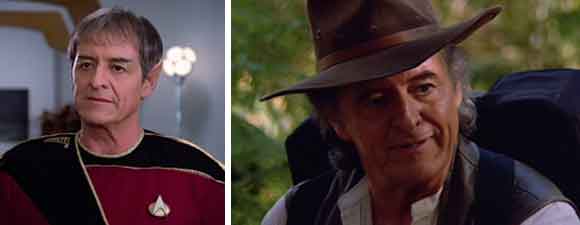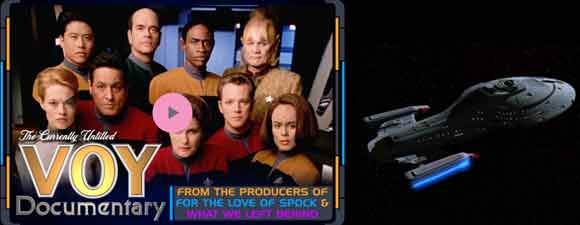Retro Review: Elogium
7 min read
Elogium
When a swarm of aliens prematurely triggers Kes’s reproductive system, she must decide whether to have a child.
Plot Summary: Chakotay catches two crewmembers smooching in a turbolift, gets hot and bothered, and asks Janeway whether she’s considered instituting a fraternization policy. Janeway says it’s natural that on a mission like this, people will begin to pair off, at which Chakotay (with a long look at her upswept hair) demands, “Including you?” Janeway blushes and stammers that, as captain, that’s a luxury she doesn’t have, then quickly brings up Mark, her regular excuse. She’s spared any further arousal when they’re interrupted about the menace of the week, a giant blob of what look like – I kid you not – space sperm. Down in the arboretum, Kes begins to eat spawn beetles, then mashed potatoes with soil mixed in. Neelix realizes something is wrong and takes her to the Doctor, who tells her she has a growth on her back. Kes panics and explains to Janeway that she is going through the elogium, the Ocampan equivalent of puberty…but because Ocampa have such short life spans, this is her only chance to have a baby. Janeway attempts to comfort her and says she’ll back any decision Kes makes, then has a tete-a-tete with Chakotay over steaming soup to discuss the possibility that the crew might need to start having children in order for the ship to get home. Kes begins the mating ritual with Neelix, but ultimately decides that she’s not ready to give up so much of her life to raise a child. Neelix is sad but resigned, and the Doctor tells Kes that because the elogium was triggered by an outside force, she might go through it again at the proper time. Meanwhile, the more passive space aliens demonstrate sexual attraction to Voyager and adhere to the hull, while a large, angry rival wants to compete for alpha status. Chakotay suggests that Voyager roll over and turn blue, acknowledging the big alien’s superiority, and the ship escapes. Janeway tells Chakotay that the next time she needs advice about mating behavior, she’ll know where to go – yes, that is an exact quote – and the two share a grin in full view of the entire bridge crew.
Analysis: The above is my original plot summary for “Elogium” altered only to correct a verb tense. In retrospect, I should’ve mentioned Wildman’s pregnancy, but I wasn’t sure at the time that we’d ever seen her again. I’d written a new summary, then reread the first and decided that it perfectly captures the spirit of the episode – even now, even after two decades. I tend to think of “Resolutions” (a.k.a. “the one where Janeway and Chakotay get stranded together and fall in love”) as the Voyager episode for which I’m most nostalgic, but that’s not true, since it was clear by the conclusion of “Resolutions” that the writers were too chicken to allow a relationship they’d spent two years developing to continue its natural progression. It’s “Elogium” which once left me with a sense of buoyant optimism that Star Trek’s writers had finally grown up and were finally ready to address how adults explore relationships, even when they’re inconvenient and unconventional. For a brief span, it’s groundbreaking not just in terms of its female characters, but in giving us a man like Chakotay who’s defined on this series far more by his relationships as a colleague, teacher, and nurturer than he is as a commander, warrior, schemer, genius, or any of the other qualities usually linked even in this progressive franchise with masculinity and machismo. I thought maybe I was just relieved at the difference between “Elogium” as advertised and the episode we actually got – not the trailer that’s on the official site now, the so-called “Aliens Run Amok” version put together for syndication, but UPN’s sexploitative original preview with the voiceover, “Kes faces the toughest decision in a woman’s life, but the real question is, WHO IS THE FATHER?” Though I’m sorry we’ve never had a proper look at birth technology in the 24th century, understanding the roles of cloning and artificial wombs, exploring the politics of reproduction and ownership of genetic material when women are no longer forced to carry fetuses, we get some lovely choices in “Elogium,” as Kes decides that she doesn’t need to have a baby just because she can, that she doesn’t want to commit to being a partner and mother. No one pressures or judges her. I’d rate this episode highly even for that even if I’d changed my mind about how Janeway comes across.
Yet this episode is deeply invested in Janeway even more than in Kes – particularly Janeway’s sexuality, which in every pivotal moment is played off Chakotay including flirting so unsubtle that it might constitute harassment if it weren’t reciprocated. Some of that is incidental on the part of the writers to get dialogue going – there’s no conceivable reason for the captain to be asking her first officer why he seems so distracted on the bridge, right as she makes yet another decision to veer from the course she hopes will get her home before Mark gives her up for dead. It seems pretty ludicrous as well that he would start a conversation within earshot of Tom Paris about restricting the sex lives of the crew. Troi would have been discreet enough to ask Picard if they could talk in the ready room. We’ll excuse that dialogue placement as the writers trying to keep the action on the bridge. And then Chakotay immediately wants to know whether Janeway will be looking for intimacy, while giving her a look that can only be described as interested – based on their overall behavior, let’s apply some of the new terms for sexuality that have come into common parlance since Voyager aired, couldn’t he be pangender, sex-negative or aromantic, couldn’t she be demisexual and biromantic – oh, but I keep looking at that shot of him sweeping his gaze up and down as if imagining her hair tumbling out of her bun, and guess what, it still looks like a classic representation of a heterosexual man realizing that a woman for whom he’s been pining has declared her availability. She friend-zones him five seconds later with a mantra that will increasingly sound like a contrived excuse over the years, when she learns that Mark isn’t waiting for her after all, but that doesn’t change my recollection that although Janeway says “I can’t” to Chakotay, she doesn’t say “I don’t want to.” If anything, as in the third season’s “Coda” and the sixth’s “Unimatrix Zero,” she seems to encourage him to stay interested. When we get what’s supposed to be the definitive shutdown on the relationship in “Shattered,” when it’s Janeway speculating about how close they could get, Chakotay tells her that there are some barriers they never cross, as if their positions are physical obstructions and without those roles and titles, anything could happen.
So no matter how much I want to ignore a romance that will be retconned and twisted to absurdity in the final season, the writers make it impossible, particularly during the intimate bridge two shots and sickbay scenes in which director Winrich Kolbe captures Kate Mulgrew’s radiance. (I don’t care how much controversy there is over The Bun Of Steel; she’s stunning in “Elogium.”) Those scenes establish parallels between Kes and Neelix as they ponder becoming mates and parents together versus Janeway and Chakotay as they contemplate their roles fostering and guiding the crew. Janeway’s behavior toward Kes is often described as maternal, but it could just as easily be paternal, conveying the same nurturing qualities that Tuvok describes in his relationship with his absent daughter and that the Doctor tries to offer Kes when she seeks his help with a ritual to prepare for pregnancy. Kes and Neelix don’t fall neatly along stereotypical gender lines either – he may bluster about his greater knowledge of predatory sexual behavior, but he’s the one in the kitchen while she’s the scientist – so it’s lovely to see the complex emotions they both bring to the question of whether to produce offspring so early in their lives and relationship. Apart from Neelix’s I-can’t-shop-at-Target-now fears that get shot down by Tuvok, we don’t hear the retro gender prejudices that come up later when the crew talks about the big alien, which suddenly stops being “it” and becomes “him” when it behaves in a sexually aggressive manner, as if being sexually dominant were an inherently male trait. The Trek franchise does a better job each series of addressing intimate and domestic issues, but even my beloved DS9 has an absurd number of single fathers and all-male households, so it’s exciting to see so many women displaying such disparate priorities – Janeway confidently in command and delighted to explore whether or not she gets home to her fiance, Torres fiercely protective of the ship and by extension the crew, Kes balancing inherited social expectations and the assumption that she’ll become a mother with a new reality that offers her undreamed-of possibilities, Wildman discovering that she wants to care as a single parent for the child she once hoped to raise with her husband. This is what the future could have looked like if the producers had had more faith in their audience and not demanded a chick in a catsuit.







“common parlance”
Haha. She’s spending too much time on tumblr if she thinks terms like “demisexual” are actually “common.”
how is it that in 7 years only 2 children were born aboard the ship?
An absurd number of single father families on ds9? 2. 3 if we count when Alexander turns up to see worf.
That’s an absurd number? The mind boggles.
I also think the gender biology of the space animals is pretty much based on an assumption with its roots in the animal kingdom and is essentially apolitical with reference to gender politics.
Meanwhile. Elogium. Not bad, not great, they should have kept that look for Kes, she was more alien and more interesting, and they may not have needed a catsuit character later (though let’s be honest, seven turned out to be much much more than that…and I say that as someone who was turned off of voyager around the time she showed up, but have come back to the whole show later and found I was wrong to stop watching. Tom and B’Ellana are a great relationship story to watch.)
We have Joseph Sisko, Gul Dukat, Benjamin Sisko, Rom, Worf, Odo (that one’s a cheat!). That’s a quick thought. Countering that, Ezri had just her mother. But I can’t think of anyone beyond that. I’ve found Trek generally has a weird thing for single parents and single children, when both are less commonplace in real life. They do seem to favour them in the male format on Trek too.
I admit I was thinking more of ongoing regulars. Jo sisko wasn’t a single parent… Sisko had an adoptive mother essentially, and when she was gone, Ben was fully grown.Dukat is an interesting case, as the jokey idea you raise of odo as parent applies to her as ziyals mother, and to Janeway as sevens mother. And to Seven as mother to the Borg Brood. Ziyal was essentially an orphan for much of the time before Dukat became an on again off again father. Largely as a slightly failed counterpoint to sisko and his positive portrayal.Either way I would say they are not over represented in a negative way at all. Not least as the loss of the other parent was shown as defining for the characters. Oddly in a way that male parents weren’t in those specific cases (Maybe Doc was a sort of fathervfigure foe seven…but also…ick) where recurring characters had that loss.
However, I would say it’s pretty progressive for Trek at the time to be doing that. Even now it’s difficult to find decent father’s in various media fictions (Neil gaimans Ocean at the End of the Lane leaves a bad taste)
I think my figure stands for ongoing characters as opposed to one offs.
Single families don’t strain the budget. Also, the spouse has to be a great character. Yates was thankfully a good character well-cast, but as much as I love Rosalind Chao, Keiko struck me as a burden the DS9 writers preferred to ship off to Bajor as much as possible.
Too many encounters with anomalies.
I don’t think I would ever gosh about this episode too much. Space slugs want to have sex with Voyager? As a kid I never cared about the burgeoning romance between the captain and first officer, and still don’t, considering how the writers ended up dealing with that. The biggest take away from watching this again is just how calming a presence Jennifer Lien was, even when she was eating bugs and flowers and showing everyone her goo hands. I never forgave the producers for letting her go and keeping Kim.
Keiko they didn’t know what to do with, which was a sham. And Rosalind Chao said as soon as the baby come along she knew she was done for, as the costs and hassles of filming just go up so much.